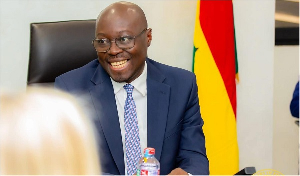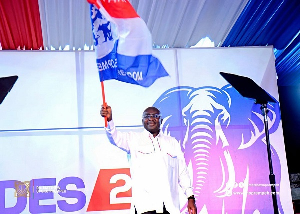Mr Andrew Awuni, Deputy Minister for Information, on Saturday denied that the Right to Information Bill was a subtle attempt by the Government to re-introduce the Criminal Libel Law.
He said the claim was far from the truth, since the government would not work relentlessly to repeal the Law, only to re-introduce it in its third year in office.
"I wish to inform you that the draft bill as it stands is simply a draft bill. Nothing in the bill is cast in stone," Mr Awuni said at the third matriculation of the Ghana Institute of Journalism (GIJ), in Accra.
He said the Right to Freedom of Information Bill would make it obligatory for government institutions to open up with information to people who need it to promote transparency and help curb secrecy, which was a breeding ground for corruption, abuse of power and mismanagement.
"It ensures transparency, probity and accountability in the dealings of public officers by providing verifiable information to the public to enable them to reach informed judgement on matters of public concern.
Mr Awuni said the government was widening access to information, adding that, the high level of contributions to discussions on national issues was a manifestation of the increasing level of people's awareness in matters of governance, independence of thought and free expression.
He said public education on the draft Bill was underway to sensitise the public and to allow various professionals to make inputs for a final product that would be acceptable to all.
It would then be placed on the floor of Parliament, saying, even then suggestions would be welcomed to improve it, adding that, so far four professional groups had facilitated discussions on the bill.
Mr Awuni said to solicit views on the bill and to make it more transparent; the draft had been placed on the worldwide web, and advertised in a number of newspapers for increased sensitisation for more inputs into the discussion.
He recalled the role of the media in the success of the 2000 elections and reminded the student journalists and those already practising that the success or failure of the 2004 elections would depend largely on the attitude of the media.
The Deputy Minister of Information reminded media practitioners to eschew partisanship in their reportage and to be objective and fair without playing one party against the other for monetary gains or other motives.
Mr Awuni asked media personnel to avoid overly reporting on political issues to the detriment of other important concerns like poverty and health, saying, other issues had to be highlighted even if it would mean embarrassing the government.
Mr David Newton, Director of GIJ, appealed to the government to give the Institute the same level of financial support like the Universities.
He also appealed to the Ministry of Education to expedite action on the Institute's request to benefit from the GETfund.
The Director said GIJ, had received comments and amendments concerning its proposed new Legislative Instrument from the National Council for Tertiary Education.
He said the Institute would soon effect the amendments in consultation with the Attorney General's Department, to place GIJ under the Ministry of Education instead of Information.
Mr Newton said the pressure for admission into both the degree and diploma programmes over the past few years was becoming increasingly unbearable, in the face of numerous problems such as limited classroom space, lack of teaching and learning materials, low salaries and poor service conditions for staff.
He announced that the Institute had introduced Certificate Courses in Public Relations, Advertising and Marketing.
There are also plans to introduce specific courses in Customer Care; Information, Education and Communication (IEC), Advocacy processes, Interviewing Skills and Economic Reporting, he said, adding that, the Institute would supplement government support with proceeds from those activities.
Mr Newton said the Institute had received 120,000 dollars from the Open Society Initiative for West Africa (OSIWA), an NGO based in Dakar, Senegal to purchase computers, radio broadcast equipment and other audio-visual materials, adding that, 10 of the computers and accessories had already been delivered.
The Ghana AIDS Commission had also awarded a 530 million cedi contract to the Institute to carry out research and other IEC activities to support the programmes of the Commission.
He said GIJ had also received favourable response on a request to the Unites States Agency for International Development (USAID) to support a programme in Economic Reporting.
The GIJ Director urged the freshmen and women to take advantage of the facilities in and around the Institute including the British Council, the United States Information Centre and the Kofi Annan ICT Centre for Excellence in their studies.
Mr Wilson Kusi-Atansah, Chairman of the National Media Commission (NMC), also called for an amendment of the GETfund Law, to make funds available for the Institute to relocate on a large track of land acquired at South Legon in 1972, to contain the expansion needed to make for its tertiary status.
He advised the student journalists against divisive tendencies and reminded media practitioners to be circumspect in their reportage in next year's general elections so as not to fan animosity and political antagonism.
The Institute admitted 40 students out of 350 qualified applicants for its degree programme and 90 from the 500 qualified applicants for the diploma programme.
Mr Teddy Konu, Registrar of the University of Ghana, administered the matriculation oath for the degree students, while Mr Kwaku Amponsah, Registrar of the Institute administered that for the diploma students.
The matriculating students swore to abide by the regulations of the University of Ghana and the GIJ.
GIJ holds matriculation ceremony
The Ministry of Information and the Ministry of Education have agreed that the Ghana Institute of Journalism (GIJ) and the National Film and Television Institute (NAFTI) should benefit from the Ghana Education Trust Fund (GETfund).The two Ministries are therefore, sponsoring a paper to amend the GETfund Law to make it possible for the two institutions to enjoy the proceeds of the fund.
Mr Andrew Awuni, Deputy Minister of Information announced the agreement on Saturday in Accra, at the matriculation of fresh students admitted into the GIJ for degree and diploma programmes in Communication Studies for the 2003/2004 academic year.
Mr. Awuni said government was working to improve the economy and raise revenue to finance education, adding it was to build a solid human capacity that government allocated significant percentage of its national budget on education.
He said the funding of education posed a big challenge to government to single-handedly cope with the rising pressure of the nation's wealth in the face of dwindling resources.
Mr Awuni commended individuals and organisations, corporate bodies and religious organisations for their support to education.
He however, said the funding of tertiary education would continue to increase, and the onus should not be on government alone, but all Ghanaians to shoulder the wheel to fund education, adding that the private sector would be the ultimate beneficiary, if it funded tertiary education.
He explained that this was because the private sector would hire qualified professionals in the pursuance and promotion programmes of government's privatisation programme.
Mr David Newton, the Director of GIJ, appealed to the government to give the Institute the same level of financial support as was to the Universities.
He said the Institute further appealed to the Ministry of Education to expedite action on its request to benefit from the GETfund.
He said the Institute, had received comments and amendments concerning its proposed new Legislative Instrument from the National Council for Tertiary Education, and the Institute would soon effect the amendments in consultation with Attorney General's Department, to place the Institute under the Ministry of Education rather the Information.
Mr. Newton said the pressure for admission into both degree and diploma programmes over the past few years was becoming increasingly unbearable, in the face of numerous problems such as limited classroom space, lack of teaching and learning materials, low salaries and poor service conditions for staff.
He announced that the Institute had introduced Certificate Courses in Public Relations, Advertising and Marketing.
There are also plans to introduce specific courses in Customer Care; Information, Education and Communication (IEC) and Advocacy processes, Interviewing Skills and Economic Reporting, he said, adding that Institute hoped to supplement government revenue with proceeds from those activities.
Mr Newton said the Institute had received an amount of 120 dollars for the Open Society Initiative for West Africa (OSIWA) for the purchase of computers, radio broadcast equipment and other audio-visual materials, adding that 10 of the computers and accessories had already been delivered.
Also the Ghana AIDS Commission had awarded a 530 million cedi contract to the Institute to carry out research and other IEC activities to support the national AIDS programme, also received a favourable response on a request to the Unites States Agency for International Development (USAID) to support a training programme in Economic Reporting.
The GIJ Director urged the freshmen and women to take advantage of facilities in and around the Institute, including the British Council, the United States Information Centre, and the Kofi Annan ICT Centre for Excellence in their studies.
Mr. Wilson Kusi-Atansah, Chairman of the National Media Commission (NMC), who chaired the ceremony, added his voice for an urgent amendment of the GETfund Law, to make funds available for the Institute to relocate on its large track of land acquired at South Legon in 1972, to contain the expansion it needs to make for its tertiary status.
He advised the trainee journalists against divisive tendencies, which did not go well with the nation as a whole, reminding media practitioners to be circumspect in their reportage in next years general elections so as not to fan animosity and political antagonism.
The Institute admitted 40 students out of 350 qualified applicants for its degree programme, and 90 from the 500 qualified applicants for the diploma programme.
Mr Teddy Konu, Registrar of the University of Ghana, administered the matriculation oath for the degree students, while Mr Kwaku Amponsah, Registrar for the GIJ administered that of the diploma students.
The matriculating students swore to abide by the regulations of the University of Ghana and the GIJ.












